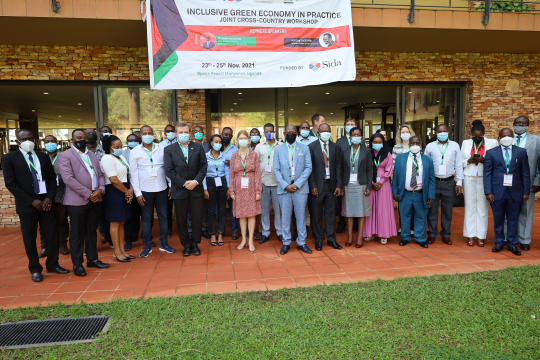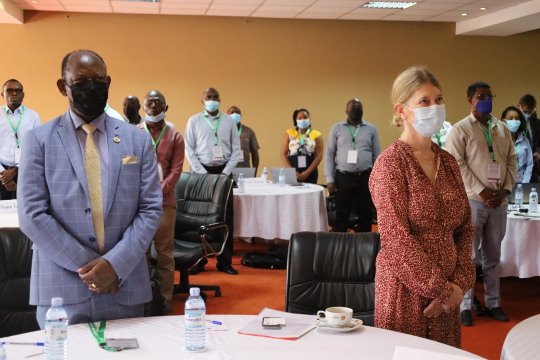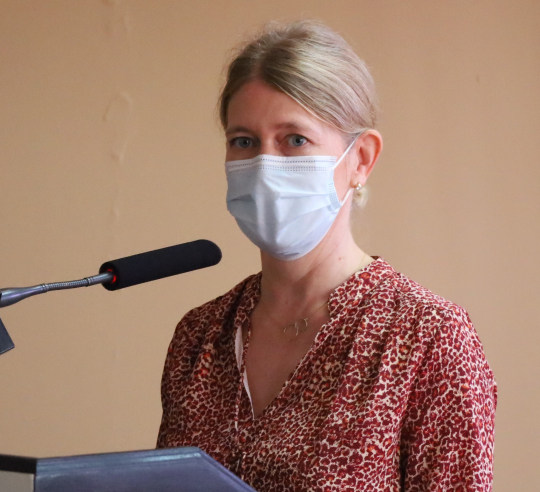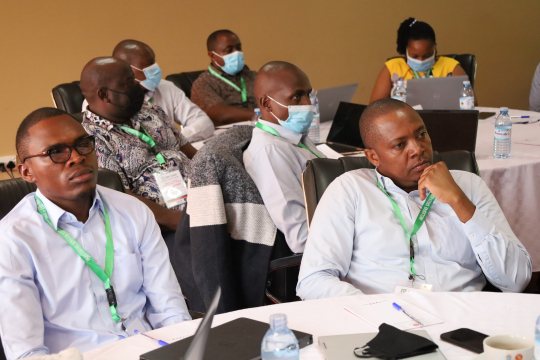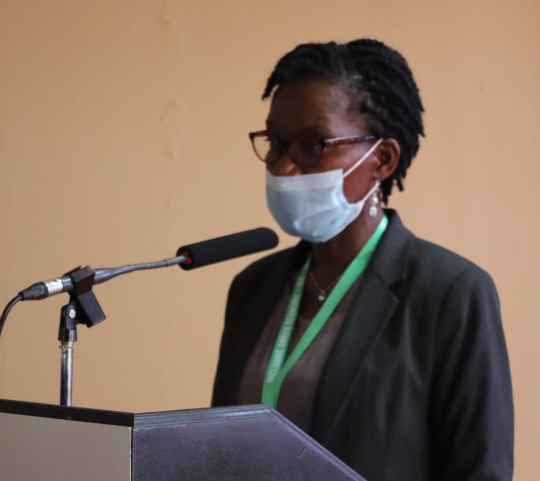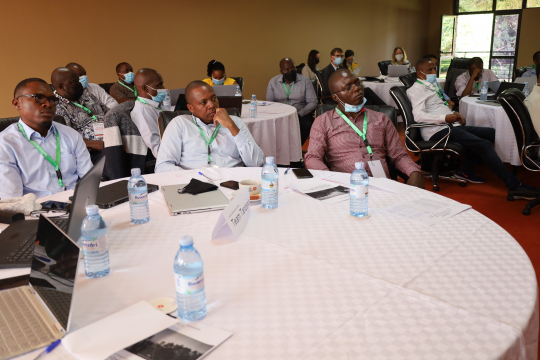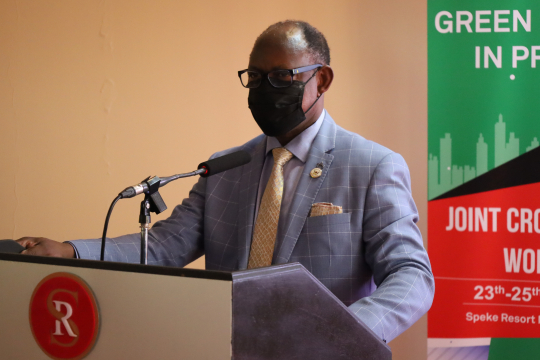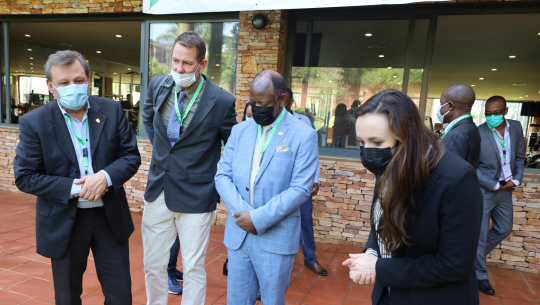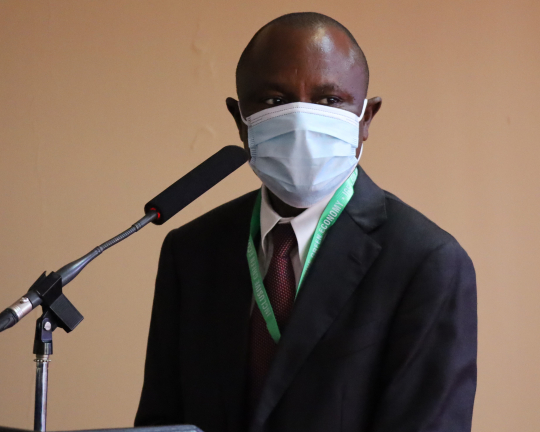A three-day workshop focusing on National Policy Reviews and training has been opened at the Speke Resort Hotel Munyonyo in Uganda. Over forty researchers and policymakers from Sweden, Uganda, Kenya, Rwanda, Tanzania, and Ethiopia participate.
The function running 23rd -25th, November 2021 is organized by the EfD-Mak-Centre in Uganda in collaboration with EfD’s Global Hub and the Gothenburg Centre for Sustainable Development (GMV) at the University of Gothenburg. It is a part of the Inclusive Green Economy (IGE) capacity-building program for senior civil servants and policymakers in East Africa and is sponsored by the Swedish International Development Cooperation Agency (Sida).
The purpose of the National Policy Review (NPR) training is to strengthen cross-country peer learning by conducting an analytical review of their neighboring country’s NPR and strengthen networks on Inclusive Green Economy in the region.
The workshop was opened by the Swedish Ambassador in Uganda Maria Håkansson. The function was also graced by the Permanent Secretary of the Ministry of Finance, Planning and Economic Development, Maris Wanyera, the Vice-Chancellor of the Makerere University Prof. Barnabas Nawangwe, and the Principal of the College of Business and Management Sciences Assoc. Prof. Eria Hisali.
Focus is on a green transition
Ambassador Maria Håkansson said the workshop comes at the right time.
“We are living in the midst of climate change. It affects all of us living now and climate and biodiversity is a top priority of my government and we see it linked to poverty reduction and economic development,” she said.
She noted that although a lot of focus today is on the COVID pandemic, there is a need to start tracking the way out of the crisis towards recovery.
“Recovery strategies need to be developed to promote inclusive growth, employment, and competitiveness. Identifying such strategies will depend on how deep and long-lasting the economic recession becomes. We must ensure that the recovery strategies keep us on track towards Agenda 2030,” the ambassador emphasized.
She reported that Sweden was the first country to pass an environmental protection act in 1967 and has continued to take a leading role in tackling climate change to government action and set a goal for carbon neutrality that is more ambitious to the Paris Agreement.
In addition, the Ambassador said that the Swedish government has successfully decoupled carbon dioxide emissions from growth since 1997 without compromising public welfare
By adopting ambitious climate policies, Sweden also wants to set a good example for others to follow and in doing so, it is one of the world's largest providers of climate financing and sharing knowledge and in programs such as the Inclusive Green Economy in practice.
Uganda’s progress towards inclusive green economy implementation
Representing the Permanency secretary, Ministry of Finance, Planning and Economic Development, Maris Wanyera said that for years, Uganda has experienced a positive trend in population growth which is associated with increased unemployment and environmental destruction.
“The country is still challenged with the abuse of natural resources especially forests and wetlands. This has raised concerns on whether the economic growth has been achieved at the expense of the environment and natural resources,” she said.
Uganda was among the first countries to mainstream SDGs into its development plan, although a strategy that unpacks green growth into sectoral interventions had not yet been devised.
In response, the government developed the Uganda Green Growth Development Strategy (UGGDS) as a blueprint to operationalize green growth principles and accelerate the implementation of global development goals, Uganda Vision 2040 and the National Development Plans 2 and 3.
The goal of the UGGDS is, according to Maris Wanyera, to achieve inclusive low emissions, an economic growth process that emphasizes effective and efficient use of natural, human and physical capital while ensuring that natural assets continue to provide for present and future generations.
To achieve the objectives of the UGGDS, Maris Wanyera said, the government requires that all new projects across all sectors include aspects of sustainable green growth emphasized in the implementation of the National Development Plan II (2015 – 2020) and currently in NDP III (2021 – 2026).
“Uganda has just recently passed the National Climate Change Act 2021 and to further augment the Green Growth Development Strategy and to address the post-COVID 19 recovery, the country is working on integrating climate-resilient and low carbon emission measures into government’s stimulus and recovery packages. The priority areas are climate finance, ICT (digitalization of sectors), resilient transport, urban and built environment, energy, human capital development, and public procurement,” Maris Wanyera said.
Environmental degradation is an urgent matter for Uganda’s academia
Vice-Chancellor Makerere University Prof. Barnabas Nawangwe said Uganda must address environmental depletion.
“There is massive use of firewood as the major source of cooking fuel, for home use and export to countries like South Africa. It may be fetching us some money but we need to think of our future generation.
As a country we need to think seriously about alternative energy sources, otherwise, we are heading for real trouble will leave our children in a difficult situation,” Barnabas Nawangwe said.
The Vice-Chancellor noted that the government has tried to come up with laws on protecting the environment but the challenge remains with enforcement. Alternatives such as the use of electricity and solar energy are in place but with limitations of affordability and reach. Prof. Nawangwe said these require the private sector to come on board to supplement government efforts.
“The university has a responsibility to conduct research, find solutions to the pressing issues, and provide the government with policy briefs to implement policies based on research. We have many researchers working on environmental issues and I am happy that the University of Gothenburg is working with Makerere on environment issues through the EfD-Mak center”, Prof. Nawangwe said.
He said the university promotes multidisciplinary research that brings together expertise in agriculture, economics, forestry, environment, and gender.
IGE fellows challenged on addressing capacity gaps
The Principal of the College of Business and Management Sciences, Prof. Eria Hisali paid tribute to the leadership of the EfD-Mak Centre for mentoring the IGE fellows in Uganda pledging commitment to support the program.
Eria Hisali challenged the IGE fellows to look at the capacity gaps in matters related to inclusive green economy noting that the training in Uganda has covered six fellows and this is only a drop in the ocean compared to the size of public service in and the challenges posed by climate change and environmental degradation.
“How fast are we going to scale up the group to reach out to a bigger number of people? The second challenge is the domestication of the concept of an inclusive green economy. With the different international protocols, experience is given and many ideas on how to take up the inclusive green economy, how much of this has been domesticated across the different countries?
Do we have a coherent framework in our countries for monitoring and evaluating the progress and how much of this concept is appreciated out there and if not, what should we do to cover the capacity gaps?” Eria Hisali asked.
By Jane Anyango
